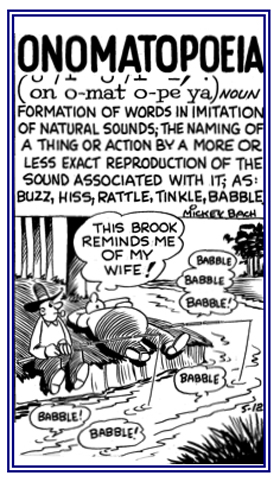You searched for:
“onomatopoeias”
1. The formation of words in imitation of sounds; a figure of speech in which the sound of a word is imitative of the sound of the thing which the word represents: The buzz of bees, the hiss of a goose, the crackle of fire, the bow-wow of a dog, and the ring, ring, ring of a bell are all examples of onomatopoeias.
2. Etymology: from Late Latin, which came from Greek onomatopoiia, "the making of a name or word" (in imitation of a sound associated with the thing being named); from onomatopoios, from onoma (genitive form of onomatos), "word, name" + a derivative of poiein, "to compose, to make"; resulting in "the making of names", "to compose a word or words", and "coining or creating words".

© ALL rights are reserved.
Go to this Word A Day Revisited Index
2. Etymology: from Late Latin, which came from Greek onomatopoiia, "the making of a name or word" (in imitation of a sound associated with the thing being named); from onomatopoios, from onoma (genitive form of onomatos), "word, name" + a derivative of poiein, "to compose, to make"; resulting in "the making of names", "to compose a word or words", and "coining or creating words".

Go to this Word A Day Revisited Index
so you can see more of Mickey Bach's cartoons.
This entry is located in the following units:
onomato-, onoma-, onomo-, onom-, ono-
(page 2)
-poeia, -poie, -peia, -poiesis, -poesis, -poeic, -poetic, -poietic, -poetical, -poietical +
(page 4)
onomatopoeias
Words that imitate or suggest the source of the sounds that they describe.
Onomatopoeias are not universally the same across all languages; they conform to some extent to the broader linguistic system they are part of; so, the sound of a clock may be tick tock in English and tik tak in Dutch or tic-tac in French.
Red mud squizzled through bare black toes;
Sucked at crusty calloused heels;
Whiffled back in lush repose:
Whished to whip around clashing wheels.
Sucked at crusty calloused heels;
Whiffled back in lush repose:
Whished to whip around clashing wheels.
This entry is located in the following unit:
-poeia, -poie, -peia, -poiesis, -poesis, -poeic, -poetic, -poietic, -poetical, -poietical +
(page 4)
